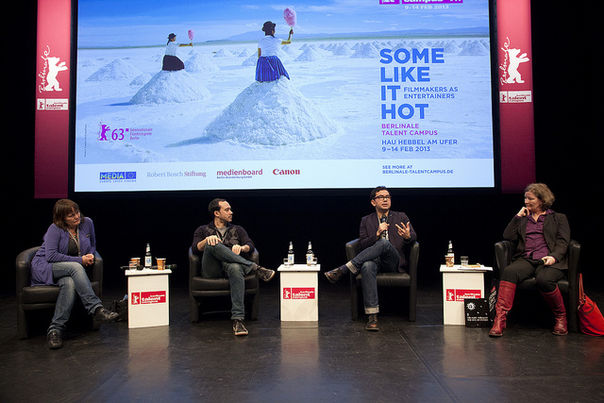The Landscape of Indigenous Cinema
“To what degree am I free to be a filmmaker and not an indigenous filmmaker?”, asks Andrew Okpeaha MacLean in the session “Indigenous Cinema: Beyond Tribe and Nation“.

“Indigenous Cinema: Beyond Tribe and Nation“
The Berlinale this year has a special segment exclusively committed to indigenous cinema. Filmmakers from Alaska to New Zealand are represented. Beyond the features, documentaries and short films that form the crux of the niche section, the festival also organised a panel consisting of Catherine Fitzgerald, a New Zealand-based film producer, Andrew Okpeaha MacLean, writer and director from Alaska, and Jason Ryle from Canada.
But what exactly is indigenous cinema culture? “It is about reflecting and chronicling ideas that stem from territories that have been traditionally colonised”, explains Jason Ryle, the executive director of the Imagine NATIVE Film and Media Arts Festival, the world’s largest indigenous festival based in Toronto. “In Canada there wasn’t a platform for indigenous films. Our festival tries to fill that void. But I’d say, over here, there is still hatred for indigenous people.”
The situation has been more favourable for Andrew Okpeaha, who has moved from Alaska to New York. “Once you leave, you become an outsider at home. They may start treating you differently. But fortunately my community back in Alaska has been very accepting and I am privileged to have freedom in my work.”
“We are all growing with this international family of cinephiles – uncovering, rediscovering and creating culture”, says Ryle. MacLean adds, “Sometimes I ask myself; how can I keep my culture alive when it is a thousand miles away? To what degree am I free to be a filmmaker and not an indigenous filmmaker? I am constantly striving to find my individual voice within the boundaries that I have to live in.”
But after the film is made, how does the home community react? “I deeply care what my community feels about my work because I have immense respect for them. But showing them your film can be extremely terrifying, and I get very nervous. Yet they are always receptive and that’s so encouraging,” says MacLean. As a parting note, Fitzgerald says, “It is very important for an indigenous filmmaker to find his own voice and make a difference. It is all about coming back to one’s roots. Any exchange of dialogue is consciously uttered because it is something rooted within my ethnicity. Many people don’t think about it but for an indigenous filmmaker, it is a cultural and, in fact, a political act.”

